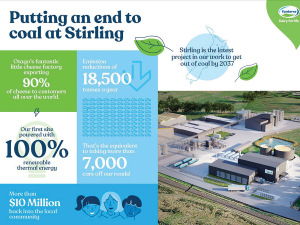Battle for milk
OPINION: Fonterra may be on the verge of selling its consumer business in New Zealand, but the co-operative is not keen on giving any ground to its competitors in the country.
 Fonterra says its Stirling cheese plant will switch from coal to wood biomass from August next year.
Fonterra says its Stirling cheese plant will switch from coal to wood biomass from August next year.
Fonterra's Stirling plant in Otago is to become coal-free by August next year.
By switching to wood biomass, the cheese plant's annual emissions will reduce by 18,500 tonnes of carbon dioxide - the equivalent of taking more than 7,000 cars off the road.
This will make Stirling Fonterra's first 100% renewable thermal energy site, a significant step towards the co-operative's goal of getting out of coal altogether by 2037.
Fonterra general manager operations Lower South Island, Richard Gray, says it's another huge decarbonisation milestone for the co-op.
"Sustainability is at the heart of our strategy and this project is something that will be good for the environment and local community. As well as the site being coal free, there are additional environmental benefits the new boiler will bring, including reduction in wastewater, noise, solid waste to landfill and air discharge emissions."
He also cites economic benefits for the community, including more than $10 million for the region, and an estimated 10 jobs in the wood biomass industry.
“Our Stirling site exports to customers in more than 10 countries, including Japan and South Korea, and we’re looking forward to sharing this news with them also.”
The wood biomass will be provided by Pioneer Energy, which is locally owned by Central Lakes Trust. The Trust distributes grants to charitable causes in the Central Otago region.
Pioneer Energy chief executive Fraser Jonker says it is very proud to be involved with and to support Fonterra’s move from coal to biomass in Stirling.
“Pioneer has a proven record for the installation of new, and conversion of existing, boilers to biomass, and with our own wood fuel division assuring quality and security of local supply for the fuel, have mitigated any perceived risk of making this very important transition to a low carbon future.”
Stirling is the third significant fuel switching project the co-op has undertaken in as many years. The conversion of Fonterra’s Te Awamutu site to wood pellets has resulted in a 10% reduction in the co-op’s coal use, and at its Brightwater site, at the top of the South Island, it is co-firing wood biomass.
Fonterra says these three projects, when combined with other energy efficiency work, will reduce its emissions by 135,000 tonnes, the equivalent of taking close to 52,000 cars off the road.
Eight of Fonterra’s 29 sites are still using coal.
Fonterra’s Stirling announcement came as Minister for Energy and Resources, Megan Woods, officially opened Fonterra’s wood pellet boiler at its Te Awamutu plant last week.
The World Wide Sires National All Day Breeds Best Youth Camp Best All Rounder plaudit has become family affair, with 2026 Paramount Cup winner Holly Williams following in her sister Zara's footsteps.
DairyNZ is giving New Zealand farmers a unique opportunity to gain hands-on governance and leadership experience within the dairy sector.
Herd improvement company LIC has posted a 5.2% lift in half-year revenue, thanks to increasing demand for genetics.
According to the latest Fresh Produce Trend Report from United Fresh, 2026 will be a year where fruit and vegetables are shaped by cost pressures, rapid digital adoption, and a renewed focus on wellbeing at home.
The Roar is a highlight of the game hunting calendar in New Zealand, with thousands of hunters set to head for the hills to hunt male stags during March and April.
OPINION: The past few weeks have been tough on farms across the North Island: floods and storms have caused damage and disruption to families and businesses.
OPINION: Fonterra may be on the verge of selling its consumer business in New Zealand, but the co-operative is not…
OPINION: What does the birth rate in China have to do with stock trading? Just ask a2 Milk Company.